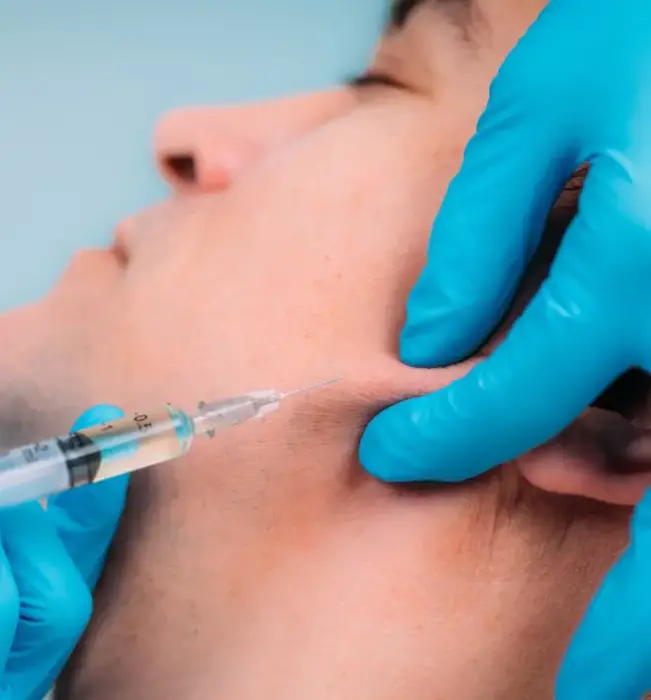
Treatments for Temporomandibular Joint (TMJ) Disorder Belmont
The temporomandibular joints are the flexible hinges on both sides of the face, which 
enable jaw movements for speaking, chewing, laughing, and yawning. Disorders of this joint can range from the mild to the severe. Symptoms may include face and neck pain, ear pain or ringing (tinnitus), headaches, clicking, popping, or grating of the jaw when opening, or restricted mouth opening. Clenching or grinding of the teeth, also known as bruxism, is another issue involving the TMJ.
Causes of TMJ Disorders and Treatment Options
- INJURY – to the jaw, muscle, nerves or TMJ
- CLENCHING OR GRINDING – placing pressure on TMJ
- DISLOCATION – of the TMJ disc or soft cushion
- ARTHRITIS – osteo or rheumatoid in the TMJ
- STRESS – emotional or psychological
- DISORDERS – sleep or breathing difficulties
Meet Our Doctors:

Dr Rooshab Malde BDS Hons (Wales), MFDS RCS (Eng), MFGDP (UK), MJDF
Owner/Principal Dentist
Using the latest technologies, perfectionist-driven Dr Malde delivers quality dental treatment in a warm, personal and calming manner. Building long-lasting relationships with his patients based on trust, compassion, education and ...

Dr Rakhee Malde BDS (KCL), MFDS RCS (Eng), MFGDP (UK), MJDF
Owner Dentist/Facial Aesthetics Clinician
Dr Rakhee Malde, a dentist and facial aesthetics clinician at Ageless Smiles Dental Centre in Belmont, excels in providing comprehensive dental care and aesthetic treatments with professional expertise.

Dr Armando Menezez BDSc (UWA)
Associate Dentist
Dr. Armando Menezes, an Associate Dentist in Belmont, brings his expertise and BDSc from UWA to provide top-tier dental care.

Rebecca Manley
Practice Manager
Rebecca Manley, as the Practice Manager at Ageless Smiles Dental Centre in Belmont, is instrumental in upholding the clinic’s commitment to exceptional patient care and smooth operations.
TMJ Treatment Options
Options for treating TMJ disorders and bruxism will be based on your individual symptoms, the complexity of your condition, and expected results. Our dentists are able to carry out a full TMJ analysis to determine the most suitable treatment options available for you. Some patients may need to try different treatment methods before relief is achieved, including:
- Massage/exercise of the TMJ and muscles
- Pain/anti-inflammatory medication
- Dental treatment/adjustments
- Oral appliance called splints
- Muscle Relaxant injections
- TMJ surgery
TMJ Injections
 Once it has been assessed, your bruxism or TMJ pain may be treated with muscle-relaxing injections. Our dentist will determine the amount of relaxant required.
Once it has been assessed, your bruxism or TMJ pain may be treated with muscle-relaxing injections. Our dentist will determine the amount of relaxant required.
Using a fine needle, the relaxant is administered into the target muscle, reducing the ability of that muscle to contract as forcefully. This reduces the tension on the TMJ and surrounding tissues to alleviate pain and the symptoms of bruxism and TMJ disorders.
This treatment takes effect within a few days, with full results being felt at around two weeks. Normal facial and jaw movements will still be possible; however, a reduction in pain, tension, spasms, or other symptoms may be reduced or no longer be present.
Results are temporary but will usually last for several months, depending on the individual. Further injections may be required to maintain ongoing relief.
All prescription medications are used in accordance with applicable Australian regulations and are only prescribed following consultation with an appropriately qualified health practitioner.
Gummy Smile Injections
A smile where the lips rise up to display an excessive amount of gum tissue is referred to as a gummy smile. By placing injections into the target muscles, a more enhanced smile may be achieved without the need for extensive gum surgery and crowns.
Results usually occur within two to fourteen days and last around three or four months. With repeated treatments done over time, results can begin to last longer.
All prescription medications are used in accordance with applicable Australian regulations and are only prescribed following consultation with an appropriately qualified health practitioner.